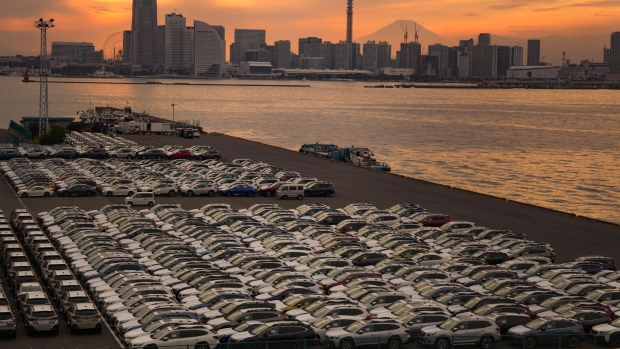Mar 27, 2023
US, Japan Strike Deal on Supply of Minerals for EV Batteries
, Bloomberg News

(Bloomberg) -- The US agreed to boost cooperation with Japan on critical mineral supply chains and to expand access to tax breaks as President Joe Biden aims to counter China’s dominance of the electric vehicle battery sector.
Following the pact, EVs that use materials that have been collected or processed in Japan will be eligible for incentives under the US Inflation Reduction Act, Japanese Trade Minister Yasutoshi Nishimura said Tuesday in Tokyo.
“This announcement is proof of President Biden’s commitment to building resilient and secure supply chains,” US Trade Representative Katherine Tai said in a statement. “Japan is one of our most valued trading partners.”
The deal is similar to an agreement Washington has been negotiating with the European Union which would extend access to some of the as much as $369 billion in handouts and tax credits available over the next decade under the IRA, in areas including wind, solar and electric vehicles.
Japan-based suppliers to the EV sector advanced in Tuesday trading. Sumitomo Metal Mining Co., a producer of battery cathode materials, rose as much as 2.1%, while separator manufacturer Asahi Kasei Corp. also gained.
The US remains highly dependent on China and demand for critical minerals will be enormous in the years ahead, Treasury Secretary Janet Yellen said Friday during testimony in the House Ways and Means Committee. “One of the goals of the IRA is to broadly strengthen supply chains for these critical minerals and their processing,” she said.
The Treasury Department is scheduled to put in place new requirements that will mandate battery components and critical minerals be sourced from free-trade agreement nations in order to get the full $7,500 per vehicle consumer tax credit. Though the EU and Japan are not part of any FTAs with the US, which has such deals in force with 20 nations, the new pacts are designed in part to give the allies the same status for critical minerals trade.
“Securing critical minerals, which are necessary for electric vehicles, is an important issue to tackle as demand for these cars is expected to exponentially increase,” Nishimura told reporters. Tai and Japanese ambassador to the US Koji Tomita signed the agreement on Tuesday morning in Washington.
US legislators have recently questioned both Tai and Yellen on the legitimacy of such deals without congressional approval. Meanwhile, several labor unions, which are a key base of support for Biden, have pushed back against the agreements over concerns they risk American jobs.
Lawmakers had been consulted on the deal, but it was negotiated under the USTR’s authority to reach agreements on specific sectors without the approval of Congress, senior Biden administration officials said in a background call with reporters.
‘Unacceptable’
While legally allowable, the agreement is already proving politically fraught in the US. It drew immediate criticism on Tuesday from the top Democratic lawmakers on the Senate Finance and House Ways and Means committees that oversee trade. They accused the Biden administration of abandoning its “worker-centric” trade policy and said they worry that it can’t negotiate meaningful labor and environmental protections, in an industry as prone to violations as mining, without legislative approval.
“The critical minerals agreement announced today is unacceptable,” Senator Ron Wyden of Oregon and Representative Richard Neal of Massachusetts said in a statement. “Agreements should be developed transparently and made available to the public for meaningful review well before signing — not after the ink is already dry.”
Republican Representative Adrian Smith of Nebraska, who leads the Ways and Means panel on trade, also criticized a lack of transparency and Congressional approval. And Public Citizen, a liberal advocacy group, warned that the deal could open the door for companies that violate human rights or hurt the environment to “launder” their critical minerals through Japan before shipping them to the US.
The pact contains a screening mechanism to ensure that critical minerals coming from “countries of concern” — which refers to China and Russia — don’t benefit from the IRA incentives, the Biden administration officials said.
Under the deal, the US and Japan will also refrain from imposing export duties on critical minerals traded between the two nations and discuss how to approach “non-market policies and practices of non-parties affecting trade in critical minerals” — another veiled reference to China.
--With assistance from Mayumi Negishi and Yuki Furukawa.
(Updates with Congress and public reaction starting in 11th paragraph.)
©2023 Bloomberg L.P.





